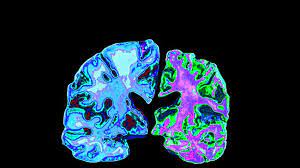Alzheimer’s and dementia can affect people in different ways. This article talks about Alzheimer’s and dementia. It does not mention families, but it talks about a few strategies for taking care of someone with Alzheimer’s or dementia.
Contents
- 1 What are Alzheimer’s and Dementia?
- 1.1 What Are The Treatment For Alzheimer’s and Dementia?
- 1.2 Challenges Faced By Alzheimer’s and Dementia Patients
- 1.3 Alzheimer’s and Dementia Care
- 1.4 Communication Challenges in Alzheimer’s and Dementia Care
- 1.5 Communication Strategies
- 1.6 Importance of Alzheimer’s Caregiver Support
- 1.7 Helping Someone with Dementia And Alzheimer’s Disease
- 2 Conclusion
What are Alzheimer’s and Dementia?


Dementia is a brain disorder that causes problems with memory, thinking, and behavior. Dementia can happen because of Alzheimer’s disease or other conditions. Alzheimer’s disease is a brain disorder that slowly destroys memory and thinking skills. Alzheimer’s changes the brain, so people who have it can also lose their ability to do everyday things.
Other causes include head injuries, postoperative depression (postpartum), exposure to pollutants such as childhood lead, infections like HIV/AIDS or Creutzfeldt-Jakob disease, vitamin deficiencies such as thiamine deficiency due to alcohol consumption; chronic subdural hematoma; normal pressure hydrocephalus; Pick Disease (a degenerative condition seen in middle-aged people that causes personality changes and problems with walking); or a brain tumor.
There are many types of dementia, including Alzheimer’s disease (the most common cause), Lewy body dementia, vascular dementia, frontotemporal lobar degeneration, Creutzfeldt-Jakob disease, Parkinson’s disease with dementia, mixed dementias such as those seen in people who have both Alzheimer’s and vascular dementias together.
What Are The Treatment For Alzheimer’s and Dementia?

Alzheimer’s disease is a form of dementia that causes problems with memory, thinking, and behavior. Treating Alzheimer’s and Dementia involves a multi-faceted approach.
- Cognitive Stimulation Therapy: This process works by engaging patients in activities that make their brains work better. This can help people who have Alzheimer’s disease, and may even stop the progress of the disease.
- Physical Therapy: People with dementia often need to exercise their bodies because they can’t always think as well. They also need to exercise their bodies because it will help them remember, balance, and coordinate things that people with dementia usually have trouble with.
- Speech Therapy: This type of therapy helps people with a sickness in the brain. They might not remember or understand things. Therapists teach them to talk and learn new words. It can be hard for these people to talk, but they can get better at it with help from the therapist.
- Occupational Therapy: A physical therapist helps you with exercises to help you do your daily life like cooking and coloring. They want you to be able to do things for yourself, even if that means asking for help from others.
- In addition to therapies, there are also medications available that can be used in conjunction with other forms of treatment. These drugs include Aricept (donepezil), Razadyne (galantamine), Exelon (rivastigmine), and Namenda.
Challenges Faced By Alzheimer’s and Dementia Patients

The challenges faced by patients with Alzheimer’s and dementia are both physical and psychological. Patients often suffer from memory loss, confusion, personality changes, anxiety, or fearfulness.
Physical Challenges
Although Alzheimer’s and dementia is mental condition, there are physical challenges that the patient will face.
- Balancing: The first instinct when walking or standing up becomes difficult for patients suffering from this disease to lean on objects which acts as support instead of putting pressure on their legs.
- Communication: if they start to leave out words during conversations making it is hard to follow what they’re saying because you’re not sure which word they meant or even where one sentence ended and another began.
- Eating: During meals many times, eating utensils become very challenging so feeding them can also become an issue. Sometimes forgetting how much food was already eaten before serving more food becomes commonplace too.
Psychological Challenges
- The effect caused by Alzheimer’s disease on patients is not only physical but also psychological. This will be evident in their behavior which can range from disorientation to aggression, agitation, restlessness, or fearfulness.
- They may get lost easily while they used to walk around with ease before developing symptoms of Alzheimer’s.
- Some do not even know who you are when it was perfectly normal for them to remember things about your family members or acquaintances beforehand.
- They might feel frustrated at times due to memory loss that makes them forget what they were doing seconds ago.
- They can also get agitated when someone tries to redirect them from an activity that they are engaged in at the moment because of a lack of understanding of how difficult it will be for them mentally with Alzheimer’s disease.
- This agitation induced by Alzheimer’s and dementia patients sometimes leads to aggressive behavior such as screaming and throwing objects around making others uncomfortable or afraid of approaching these individuals anymore.
Alzheimer’s and Dementia Care
Caregiving In Early Stage
Caregivers who do not know that they have dementia or Alzheimer’s can be hard. It is hard to take care of someone with no symptoms. Highlights: This can lead to difficult behavior. It is hard to understand why a person is acting differently if you are caring for them. Dementia care is challenging enough without having to deal with this additional factor.
Caregiving In Middle Stage
As the disease progresses, caregivers will begin to notice changes in their loved ones. When people get older, they may find themselves confused and forgetful. This happens sometimes. It does not mean they cannot do anything anymore. They might be a little overwhelmed at times because of this, but it is okay to ask for help from others. When this happens, it is good for caregivers to understand what is happening and how they can best communicate with their loved ones.
Caregiving In Late Stage
As the disease progresses, caregivers will begin to notice changes in their loved ones. People who have dementia might find it hard to remember things that were easy for them before. They may also become stressed or confused by situations that weren’t hard for them before. When this happens, it is important for caregivers to know what is happening and also how to communicate with their loved ones.
Communication Challenges in Alzheimer’s and Dementia Care

People with dementia and Alzheimer’s may not always be able to communicate their thoughts, feelings, or needs. Caregivers should learn about the different challenges of communicating with a person who has Alzheimer’s. This includes:
- Receptive language problems where they cannot understand words or sentences;
- Expressive language problems when they can say things but it is difficult for them to get out what they mean;
- Non-verbal communication is important in showing emotions which can include facial expressions, body language, and tone of voice.
- People who have actionable thinking issues can’t stop on one idea. They’re always thinking about this idea.
Communication Strategies
Communicating with a loved one who has Alzheimer’s or dementia is challenging but there are ways that caregivers can communicate more effectively by:
Remaining patient and understanding
- Talk to your loved one and be clear. Speak slowly and use simple words. If you need to, break it down into steps so they understand. Ask them what they want to know and tell them only what they want to know. Give them pictures or written instructions if it is needed, but not too many at once so they don’t get overwhelmed too quickly.
- You need to provide structure and routine. This helps your loved one feel safe, secure, and comfortable in a situation where they might be confused or disoriented.
- Avoid arguing by not saying the same things that the other person does. Instead, accept these limitations and help the person feel good about themselves even though they may not be able to speak well.
Using humor and distraction to ease tension in a conversation.
Caregivers should know that it is normal when the people they take care of are frustrated or upset during conversations. This can be because the person cannot express what they want, remember words, or understand what you mean. You can help if you learn how to communicate with this person better by understanding the different types of dementia that exist, including:
Alzheimer’s Disease, Vascular Dementia, Frontotemporal Degeneration (FTD) which includes Pick’s Disease, Motor Neuron Disease (MND), Progressive Supranuclear Palsy (PSP), and Dementia due to Parkinson’s disease as well as Huntington’s Chorea. Doctors will have more success when they understand how this person communicates and what triggers outbursts or frustration in them.
Importance of Alzheimer’s Caregiver Support
Caregiving can be difficult and it is important that caregivers take care of themselves. There are many ways to do this, including:
- Getting enough sleep so you have the energy you need every day;
- Taking time out for yourself by doing something relaxing or using your talents in a hobby;
- Talk to other caregivers who have had similar experiences and problems as you. You can meet with them in person or online;
- Having time set aside every day where you do something that is just for yourself like exercise, reading a book, watching TV. If possible, schedule this time into your calendar so it doesn’t get skipped because of a more pressing matter.
- People who have Alzheimer’s or dementia need their caregivers to be patient, understanding and kind as they communicate with them.
Caregivers should keep this in mind even if it is difficult for them. They can help by trying different communication strategies that work best for the person they are taking care of as well as themselves.
Helping Someone with Dementia And Alzheimer’s Disease
When someone you care about gets Alzheimer’s disease or other dementia, you will need to change how you act around them. You can still have a very loving relationship, but it may look different. The person who has Alzheimer’s may not always be able to do the things they used to. This is hard for both of you, but it can be made easier if you know what to expect and plan ahead.
This section will tell you about Alzheimer’s disease. You can know what to expect. You might want to talk with someone who has it. If they don’t, you can still help them do things like cook and clean their house. We’ll also give advice on how you can best support them and their family.
Conclusion
Alzheimer’s and dementia care is a serious matter. It affects many people, including the caregivers of those suffering from these conditions as well as their families. That’s why it’s important to have an educated understanding about what they are and how you can help your loved one live with them comfortably for as long as possible. This article contains some tips on Alzheimer’s and dementia care that we hope will be helpful in caring for someone close to you or even yourself if you’re at risk of developing either condition.
If you are looking for affordable Online Counseling MantraCare can help: Book a trial therapy session


